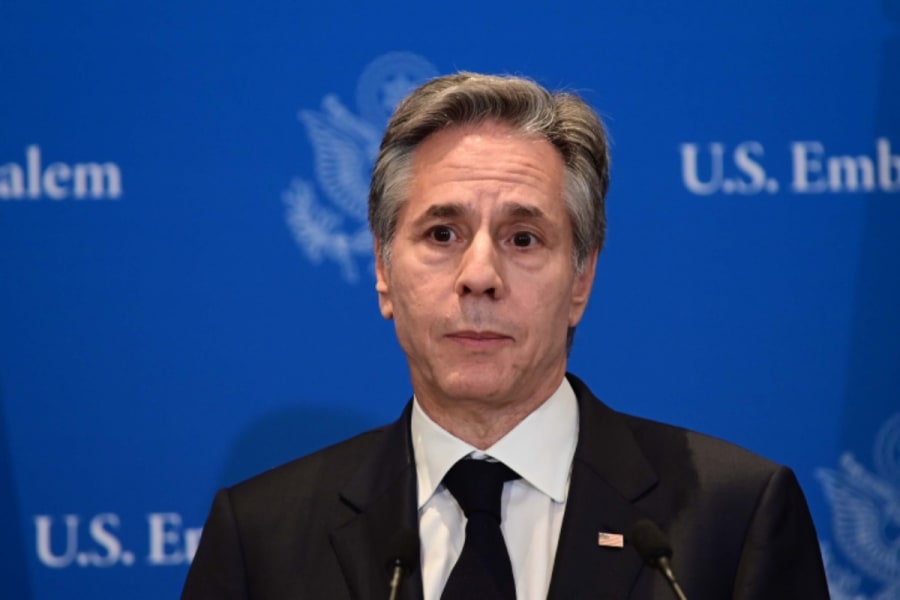Blinken warns Palestinian state push is 'too hasty,' says priority is easing 'suffering of Palestinian civilians and Israeli hostages'

Former U.S. Secretary of State Antony Blinken criticized the timing of the push for a Palestinian state in an editorial published on Monday. He said the plans to discuss practicalities regarding a new Palestinian state at the UN General Council next month were premature, preferring to focus on the humanitarian crisis in Gaza and the hostages.
Though not against the idea of a Palestinian state per se, Blinken’s piece, published in the Wall Street Journal, explained his position regarding the order of priorities.
In contrast to those who have described a Palestinian state as “a reward for terrorism,” Blinken suggested it was a rebuke rather than a reward, since it would remove the complaint against Israel and therefore the legitimacy of the terror group’s political rule in Gaza. However, he stated that the creation of a Palestinian state was secondary to the urgent plight of the hostages and Gazan civilians.
"The decision by France, the U.K., Canada and Australia to recognize a Palestinian state in September is morally right and reflects a global consensus," he affirmed in his editorial. Furthermore, he said it would be a necessary precondition for Israel to normalize relations with Saudi Arabia, clarifying that recognition should be based on predetermined conditions.
However, following Israel’s announcement that they intended to take over the entire Gaza Strip, Blinken plainly stated his commitment to alleviating the suffering of Gazan civilians and also Israeli hostages, suggesting they would not be served by the cabinet’s radical proposal.
"With the Gaza crisis still unfolding, this focus on recognition seems totally beside the more pressing realities. Amid the suffering of Palestinian civilians and Israeli hostages—and Israel’s announced plan to occupy all or part of the enclave—averting famine, recovering the hostages and ending the conflict in Gaza are the priorities. Talk of two states can wait," he insisted.
He suggested that three years was a more reasonable timeline, and that the United Nations Security Council could assess whether the necessary preconditions could be met, reminding Israel that the US can still hit the eject button on any premature plans that might endanger the Jewish state. “America’s veto would reassure Israelis,” he offered.
Towards the end of the Biden administration, Blinken asserted that Israel would have to accept a unified West Bank and Gaza under the Palestinian Authority's control, saying, "We believe that the Palestinian Authority should invite international partners to help establish and run an interim administration with responsibility for key civil sectors in Gaza."
In his recent editorial, Blinken put forward his opinion that the hostages would not be served by a full occupation of Gaza, but that recognizing a Palestinian state could speed up normalization of ties with Saudi Arabia, an alliance that would likely bolster Israel’s security.
“Israel long ago achieved two of its three stated objectives in Gaza,” Blinken said, now that the military capability of Hamas has been shattered and those responsible for the Oct 7 attack have been killed. He suggested that a full occupation of the Strip would only extend the conflict and increase suffering for both Israelis and Palestinians.
Pointing to the Arab nations that recently denounced Hamas and called for the terror group to be disarmed, Blinken said that they would be willing to help govern the enclave and expel Hamas if they were persuaded “a credible political path toward Palestinian self-determination” was on the table. However, he conceded that the right conditions were essential:
“No one should expect Israel to accept a Palestinian state that is led by Hamas or other terrorists, that is militarized or has independent armed militias, that aligns with Iran or others that reject Israel’s right to exist, that educates and preaches hatred of Jews or Israel.”
The former U.S. secretary of state also stated his conviction that Israel must address the humanitarian crisis and develop a plan to withdraw from Gaza. He also expressed his expectation that Israel would stop the expansion of settlements and the demolishing of Palestinian homes, as well as show determination to tackle extremist violence, supporting the reform of the Palestinian Authority instead of trying to undermine it.
He criticized as unfeasible both Israel’s expectation that the Palestinian people would perpetually put up with being a “non-people without national rights” and also the Palestinian longing for a state “from the river to the sea.”
“No one is going anywhere, whatever the delusions of extremists on both sides,” he said.

Jo Elizabeth has a great interest in politics and cultural developments, studying Social Policy for her first degree and gaining a Masters in Jewish Philosophy from Haifa University, but she loves to write about the Bible and its primary subject, the God of Israel. As a writer, Jo spends her time between the UK and Jerusalem, Israel.
You might also like to read this:
















